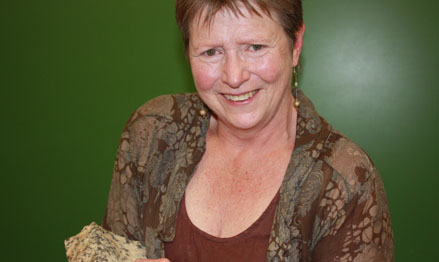Latest News Archive
Please select Category, Year, and then Month to display items
11 September 2024
|
Story Anthony Mthembu
|
Photo Anthony Mthembu and Chelsea Carolus
 From the left: Geraldine Lengau, Senior Officer in the Unit for Institutional Change at the UFS; and Oratile Reina, West College Prime.
From the left: Geraldine Lengau, Senior Officer in the Unit for Institutional Change at the UFS; and Oratile Reina, West College Prime.
As part of the initiatives lined up for College Week, the student leaders of West College at the University of the Free State (UFS) hosted a dialogue that primarily focused on discussing social justice as a value of Vision 130. The dialogue was held at Outeniqua Residence on 3 September 2024 and was well attended by students within West College.
According to Oratile Reina, West College Prime, “the motivation for the dialogue was to prepare newly elected leaders and our college community to align their efforts with Vision 130 – a vision that aims to create a more inclusive, equitable, and socially just environment on campus”. As such, she highlights that the dialogue was an opportunity for leaders to discuss practical strategies for implementing these values in their respective spaces, and to encourage those in West College to become better citizens inside and outside the university.
A conversation on social justice
The dialogue was facilitated by Geraldine Lengau, Senior Officer in the Unit for Institutional Change and Social Justice at the UFS. Lengau touched on several aspects pertaining to the topic of discussion. Firstly, she allowed the audience to give their definition of social justice, especially as students within the institution. In addition, she went on to talk to the audience about sexual assault in the context of social justice. In this instance, Lengau gauged whether the students knew which processes to follow in the event of a sexual assault incident, and whether they were acquainted with the UFS Sexual Harassment, Sexual Misconduct, and Sexual Violence Policy. Furthermore, the audience was given the opportunity to outline what social justice looks like to them in the spaces they occupy, including in their respective faculties, the sports they play, and the leadership structures they form part of. “I was encouraged to see that students take their right to a socially just university in very high regard, and that they were willing to break it down from what Vision 130 proposes, in order to align it with their common understanding,” said Lengau.
As the dialogue concluded, the audience signed a pledge committing to uphold the values of Vision 130. According to Reina, “The pledge represents a promise to take concrete steps towards fostering an inclusive and equitable campus culture. By signing the pledge, the leaders are not only agreeing to embody these principles in their leadership roles but are also holding themselves accountable to their peers and the broader university community.”
Prof Tredoux turns theories regarding the formation of metals on its head
2013-09-17
|
 |
|
Prof Marian Tredoux
17 September 2013 |
The latest research conducted by Prof Marian Tredoux of the Department of Geology, in collaboration with her research assistant Bianca Kennedy and their colleagues in Germany, placed established theories regarding how minerals of the platinum-group of elements are formed, under close scrutiny.
The article on this research of which Prof Tredoux is a co-author – ‘Noble metal nanoclusters and nanoparticles precede mineral formation in magmatic sulphide melts’ – was published in Nature Communications on 6 September 2013. It is an online journal for research of the highest quality in the fields of biological, physical and chemical sciences.
This study found that atoms of platinum and arsenic create nanoclusters, long before the mineral sperrylite can crystallise. Thus, the platinum does not occur as a primary sulphur compound. The research was conducted at the Steinmann Institute of the University of Bonn, Germany, as well as here in Bloemfontein.
Monetary support from Inkaba yeAfrica – a German-South African multidisciplinary and intercultural Earth Science collaborative of the National Research Foundation (NRF) – made this research possible. Studies are now also being conducted on other metals in the precious metal group, specifically palladium, rhodium and ruthenium.
The discovery of the nanoclusters and the combination with arsenic can have far-reaching consequences for the platinum mine industry, if it can be utilised to recover a greater amount of platinum ore and therefore less wastage ending up in mine dumps. This will signify optimal mining of a scarce and valuable metal, one of South Africa’s most important export products.
For Prof Tredoux, the research results also prove thoughts she already had some twenty years ago around the forming of platinum minerals. “Researchers laughed in my face, but the evidence had to wait for the development of technology to prove it.” Young researchers were very excited at recent congresses about the findings, since the new models can bring new insights.
“Chemistry researchers have been talking about platinum element clusters in watery environments for quite a while, but it was thought that these would not appear in magmas (molten rock) due to the high temperatures (>1 000 degrees celsius).”
Prof Tredoux has already delivered lectures at congresses in Scotland, Hungary, Sweden and Italy on this research.
Read the article at: http://www.nature.com/ncomms/2013/130906/ncomms3405/full/ncomms3405.html